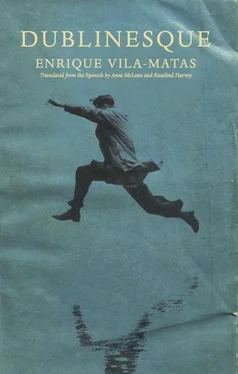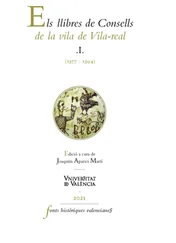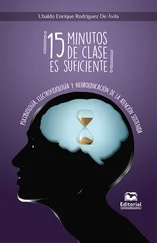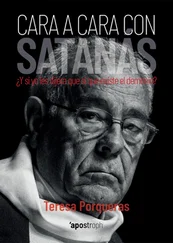In that house in Brooklyn — and this he couldn’t even have suspected — the happiness he’d looked for in vain on his first trip to that city awaited him. It came to him suddenly, at midnight, when he realized he was in the Austers’ house in that wonderful city. What more could he ask for? The Austers were the very incarnation of New York. And he was in their house, he was at the very center of the world.
It was a moment of happiness he remembers as very intense, similar to that of his recurring dream. Everything seemed so agreeable; he felt in the best mood at that moment. But something he never expected happened. Because of his jet lag, and despite his fantastically happy state, he couldn’t help yawning a few times, which he tried to hide with his hands, and this made it even worse. Body and soul were completely divided, each with their own language. And it was clear that the body, with its own codes, found itself radically disconnected from that moment of his spirit’s happiness. “When the spirit soars, the body kneels down,” said Georg Christoph Lichtenberg.
He’ll never forget the moment that night when he thought about telling Paul Auster that, according to something he’d read in a magazine a while ago, when we yawn it doesn’t mean we’re bored or sleepy, but rather the opposite, that we want to clear our heads and so manage to be even more awake than the wide-awake and happy people we are. He remembers this moment very clearly and also when he realized afterward it would be better not to say anything and not complicate things even further, and then, without being able to help it, he yawned again and had to cover his wretched mouth with his hands.
“Will you leave something as a deposit?” Auster asked him.
He didn’t understand the question at the time, or over the following days. Since they were speaking in French, he started to think he hadn’t understood because of the language. But Nietzky has confirmed on several occasions now that that’s what happened, that Auster did, in fact, ask him if he was going to leave something as a deposit.
Maybe Auster was asking if he was going to leave the memory of his yawns as a deposit, a supposed advance on the rent. The rent for that brownstone? Did Auster know that his guest that night wanted, more than anything in the world, to live in that house? Maybe Nietzky had told him?
Over the last few months, he’s turned over this strange question of Auster’s many times in his head, but it remains an unsolved mystery. Sometimes, he’s at a bus stop, or sitting at home in front of the TV, and he thinks about this and still hears the question, as if charged with an inexplicable energy.
“Will you leave something as a deposit?”
On YouTube he comes across a very young Bob Dylan singing “That’s Alright Mama” with Johnny Cash, and observes, with a mixture of surprise and curiosity, that the acclaimed Cash sings here with a resigned expression, as if he’d had no choice that day but to accept the sudden company of the unknown young genius, who’d jumped up onto the stage without anyone’s permission.
Riba observes that the presence of the young Dylan at his side doesn’t irritate Cash, but even so he seems to be wondering why he has to sing with this young genius who’s latched onto him. Perhaps young Dylan is trying to become Cash’s guardian angel? Maybe Dylan is an impromptu guardian of Cash’s creations?
He ends up thinking something similar occurred with him and Nietzky, who for months he confused with the genius he was always searching for among young writers. Later, when he realized Nietzky had great talent but wasn’t the special writer he would so like to have found, he resigned himself to seeing him just as he was, which was a pretty good writer anyway. He wasn’t the giant of literature he’d been looking for as a publisher, but he found traces of a lively, exciting creativity in him, which was more than enough.
Riba published When You Wound Brooklyn , Nietzky’s only novel, and has always thought it very good. A story about Irish characters in modern-day New York. A splendid piece in which his young friend had managed to give a new and unexpected turn of the screw, offering a world of heteronyms, a world of characters unable to be unified, compact, or perfectly outlined subjects. An amusing, strange book, in which the New York Irish seem like Lisboans who have just awoken from one of Pessoa’s highly anxious siestas. There were never stranger Irish people in a novel.
Because of all this and many other things, because of his ever-increasing admiration for Nietzky, a young man of indisputable talent, he doesn’t give it another thought and fires off an email, one he hopes will be as direct as a bolt of lightning, filled with energy like the tormented psyche of this promising Spanish New York writer. An email to Nietzky’s apartment on West 84th Street and Riverside Drive. In it he asks him to be the fourth member of the Bloomsday expedition. He ends up saying: “After all, you went there last year — and other times, I think — I know you flew from New York to go to the Bloomsday celebrations, and so it wouldn’t be at all strange for you to want to repeat the experience. Come on!”
This “come on!” has a special power, because suddenly, as if he too were given the fleeting ownership of a certain neurotic energy, he feels as if he’s penetrating the essence of the wind that’s blowing outside with the rainwater spreading throughout Barcelona: he believes for a few moments — a sensation without a doubt totally unknown to him — that he’s inside the wind’s thoughts, until he understands that the wind’s mind could never be his or anyone else’s, and then he contents himself — a sad fate — with a deeply ridiculous thought: the world always feels more spacious in the spring.
For years now he’s led his life through his catalog. And in fact he now finds it very hard to know who he really is. And above all, what’s even harder: to know who he really might have been. Who was the man who was there before he began publishing? Where is this person who gradually became hidden behind the brilliant catalog and the systematic identification with the most interesting voices contained within it? Now some words of Maurice Blanchot spring to mind, words he’s known well for a long time: “Would writing be to become, in the book, legible for everyone, and indecipherable for oneself?”
In his work as a publisher, he recalls the day he read these words of Blanchot’s as a turning point, and from that moment on, began to observe how, with each book published, his authors gradually became more and more dramatically indecipherable to themselves at the same time as they shadily became very visible and legible to the rest of the world, starting with him, their publisher, who saw in the drama of his authors one more consequence of the occupational hazards of his job, in this case, the hazards of publishing.
“Oh,” he said very cynically one day during a meeting with four of his best Spanish writers, “your problem has been getting published. You’ve been very foolish to do so. I don’t understand how you didn’t sense that publishing was going to make you all indecipherable to yourselves, and what’s more, would place you on the path of a writer’s fate, which in the best of cases always contains the strange seeds of a sinister adventure.”
Riba was hiding his own drama behind these cynical words. Leading a publisher’s life kept him from finding out who the person gradually hidden behind the brilliant catalog might have been.
Nietzky might be the perfect companion for the trip to Ireland, and could even be the brains of the expedition, as he always has original ideas, and despite his youth, is a real expert on the work of James Joyce. In Spain the Irish writer’s importance tends to be downplayed, and what’s more, it’s become grotesquely commonplace to brag about not having read Ulysses , and also to say it’s an incomprehensible and boring book. But Nietzky has been out of the country for ten years, and can’t exactly be considered a Spanish Joyce specialist anymore. Really, Nietzky can now only be seen as a young writer and citizen of New York, a man well versed in local Irish topics as filtered through the color of Lisbon tiles.
Читать дальше












